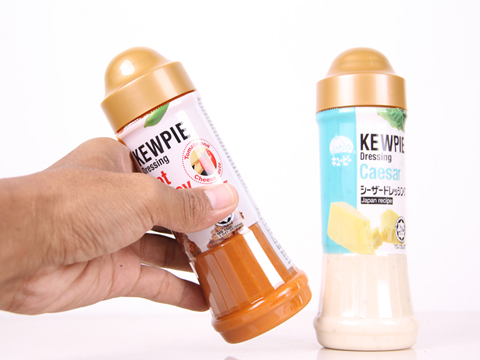
Kewpie Corporation will pilot recycled salad dressing caps in a partnership with Refinverse, Mitsubishi Chemical Corporation, Toyo Seikan Group Holdings, Kasumi Co., and the city of Kashima – reportedly conducting the first project in Japan to derive resin from recycled plastics converted into oil via supercritical water.
This ‘Pla-relay Project’ aims to unite a local government, waste collection company, chemical, packaging and food manufacturers, and a supermarket to chemically recycle caps and inner plugs from salad dressing bottles – in turn overcoming the challenges traditionally associated with sorting, collecting, and recycling multi-material plastic containers.
Refinverse will collect caps and inner plugs from public elementary schools in Kashima City, pretreating them for Mitsubishi Chemical to convert into raw material at its new chemical recycling plant. Japan Polypropylene and Japan Polyethylene will turn this into plastic resins.
Toyo Seikan Group subsidiary Mebius Packaging will mould the plastic resin into caps and plugs for Kewpie’s salad dressing bottles, which will be available in a limited run at Kasumi’s Kashima Stadium Store this summer.
In doing so, the partners aim to validate and establish a framework for creating a closed-loop recycling process for post-consumer plastic waste within a specific area. They plan to examine such factors as the quality and quantity of waste plastics required; any issues related to the recycling process; the necessary certifications and procedures to acquire; how to get consumers on board with products made from recycled materials; and how to cover the costs associated with the process.
The six partners also plan to develop and publish a “validation report on the closed-loop recycling of plastic packaging” by March 2026, compiling the specified factors and feedback collected through the course of the project.
During the pilot, public elementary and junior high schools in Kashima City will have the opportunity to research and study plastic resources, tour participating companies’ plants, and get involved in recycling education programmes.
A similar project took place last summer, when Mitsubishi Corporation joined forces with Neste to help Japanese brands develop value chains for renewable chemicals and plastics; this effort sought to defossilize supply chains in the food and beverage, apparel, and consumer electronics sectors, lowering greehouse gas emissions and reducing reliance on fossil resources.
The partners previously worked with Suntory and ENEOS to produce PET resin from ‘renewable’ Neste RE feedstock, which was then anticipated to be used in manufacturing bottles for Suntory.
In other news, performance lubricants manufacturer Green Oil has transitioned into a 100% post-consumer recycled bottle and cap solution from Berry Global. While the polypropylene closure and applicator nozzle previously posed a challenge due to the absence of a reliable recyclate stream, Berry’s proprietary CleanStream recycled plastic has enabled the use of PCR and made the components recyclable at end-of-life.
If you liked this story, you might also enjoy:
Reuse vs. single use – which is better for the environment?
Sustainable Innovation Report 2025: Current trends and future priorities
What can the world learn from South Korea’s world-leading performance in plastics circularity?














No comments yet